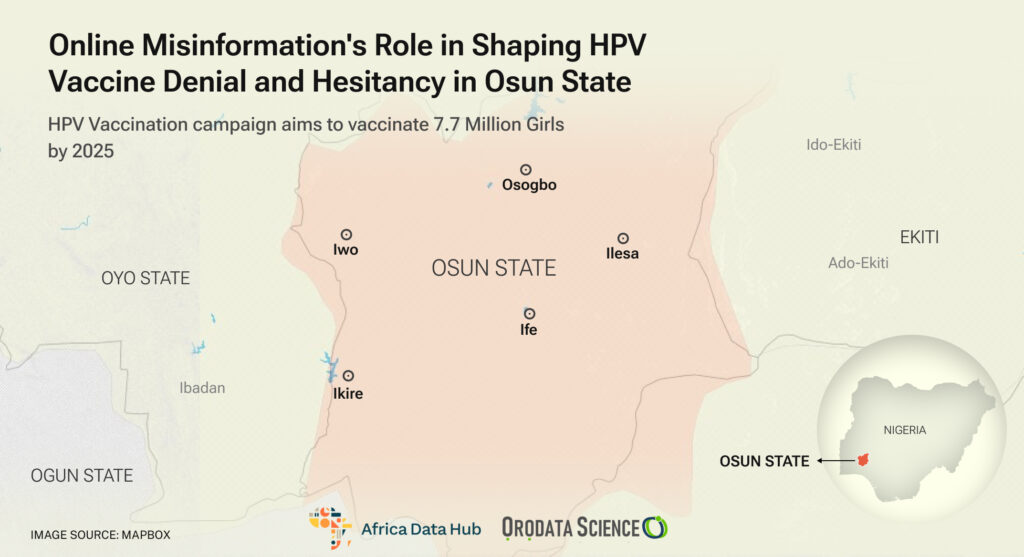Osun State is currently facing a challenging bout with human papillomavirus (HPV) vaccine hesitancy, fueled by online misinformation, political rumours, and a lack of awareness about the vaccine’s purpose.
In October 2023, the federal government introduced the HPV vaccine into its routine immunization system, aiming to reach 7.7 million girls by 2025. It started a nationwide campaign with 14 pilot states and the FCT while the remaining states will be done in the second phase starting in May 2024.
By December 2023, the nationwide campaign had vaccinated about 4.7 million girls; however, Osun continued to experience pushback, with citizens resisting the campaign due to misinformation and a lack of understanding about the vaccine’s significance.
However, after increased enlightenment campaigns by state health and education officials, supported by traditional and community leaders, the resistance reportedly decreased and some schools that initially refused the vaccine later called for immunization officers to return.
The Centers for Disease Control and Prevention (CDC) had earlier recommended the HPV vaccination as a preventive measure against the Human papillomavirus, a common cause of various cancers. HPV, a sexually transmitted infection, can lead to cervical, vaginal, vulvar, penile, and anal cancers.
The agency then introduced vaccines to bolster people’s immune systems against high-risk HPV, preventing the development of cancerous cells especially cervical cancer which took the lives of over 8000 Nigerian women in 2020
According to the United Nations, HPV is responsible for at least 70% of cervical cancer cases in Nigeria, making cervical cancer the third most common cancer in the country.
Research even indicates that while the vaccines cannot treat the virus, they can effectively prevent its contraction if administered early, ideally before the teenage years.
Sadly, similar to previous vaccination exercises, some parents in Osun resisted allowing their children to receive the HPV vaccine despite the government’s efforts. A significant factor found to have been contributing to this hesitancy was misinformation spread through social media, coupled with political rumours and a lack of awareness about the vaccine’s purpose.
Health practitioners who participated in the immunisation campaign across local governments in the state complained about the initial repression against the exercise where schools and parents refused to allow their teenage girls to collect the vaccine citing the unfounded online misformation about it affecting future fertility and aimed at decreasing the population.
Another OIC of a PHC in Ilase area of Obokun LGA who declined to be named noted that information available to the people about the vaccine is not enough to adequately prepare them for the exercise. Many myths, rumours and misinformation about the vaccine ought to have been adequately debunked, even in rural areas before starting the exercise.
Reports from Orodata Science Frontline Investigative reporting project showed that only a small percentage of the PHC workers in the state have been trained in the last five years.
A Monitoring and Evaluation Officer, Mrs Aladewusi who was part of the immunisation campaign team in Osogbo LGA opined that the vaccine would have reached more people if not for the social media misinformation and rumours.
She cited the case of a woman who later brought her daughter to collect the vaccine at the PHC herself after knowing that the vaccine was to prevent cancer. The woman told them she had lost her mother to cancer earlier.
In an effort to debunk myths, combat misinformation and increase acceptance of the vaccine, the Osun State Primary Health Care Development Agency(OSPHCDA) took strategic actions by engaging stakeholders such as traditional leaders, legislative members, market and artisan union leaders, religious leaders, LGAs and LCDAs chairpersons, and youth leaders to promote awareness and acceptance.
The state also utilized mass media, aired on local broadcast stations, to sensitize the public about the vaccine and its role in preventing cancer.
The Director of Medical Service, OSPHCDA, Dr Oluyemi Ogundun noted that the online misinformation threatened the vaccination in the state as there had been a certain level of acceptability and anticipation for the vaccine in the state before the rumour thwarted it and raised fear in the citizens.
“We also encouraged all our health workers in the state to share a sensitisation message drafted by the board to their personal networks and social media platforms. We did a voice recording that was sent around WhatsApp groups. Our positive ones will counter the rumour as the negative ones go.” Dr Ogundun said while explaining how the board strategically employed the concerted effort of relevant stakeholders in the state and the media to arrest the situation in time.
According to health experts, vaccine denial and hesitancy, driven by misinformation and political rumours, are not new challenges in Nigeria.
Yet, despite expert research and health practitioners’ efforts to dispel myths, hesitancy persists, as seen during the introduction of the HPV vaccine and the COVID-19 vaccine.
Dubawa, a prominent African fact-checking platform, had also debunked social media falsehoods about the HPV vaccine two months into the vaccination campaign.
In the report, Dr. Nathaniel Adewole, an associate professor of obstetrics and gynecology and chief consultant gynaecologist at the University of Abuja Teaching Hospital, emphasized that the vaccine has no connection to infertility or death, urging citizens to seize the opportunity to protect against cervical cancer.
He noted that the vaccination campaign is a massive investment by the government, judging by the cost of the vaccine, saying: “The vaccine is costly for the government to say it’s now free, and people are saying something else. Remember, it is the same people that developed vaccines to reduce polio, measles, whooping cough, and many other things.”
Osun’s battle against HPV vaccine hesitancy is actually a reflection of broader challenges in public health communication, stressing the need for proactive strategies to dispel misinformation and promote vaccine acceptance.
This story was produced for the Frontline Investigative Program and supported by the Africa Data Hub and Orodata Science.

